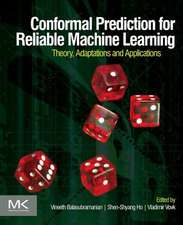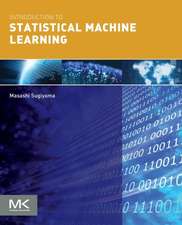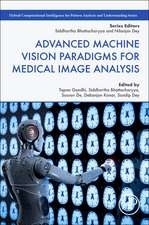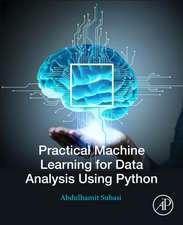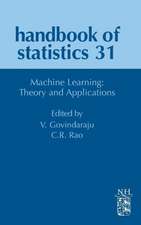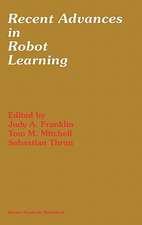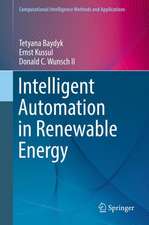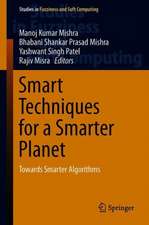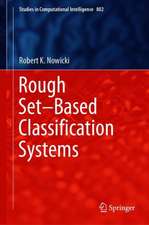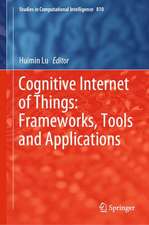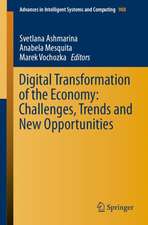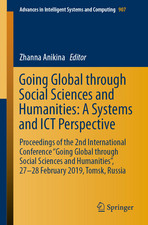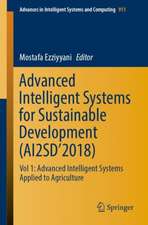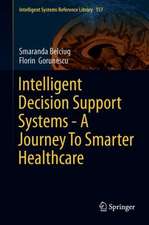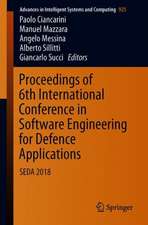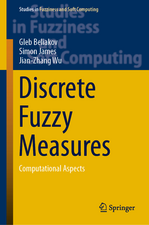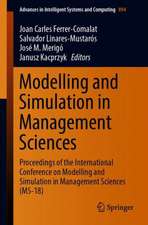Machine Learning: A Guide to Current Research: The Springer International Series in Engineering and Computer Science, cartea 12
Editat de Tom M. Mitchell, Jaime G. Carbonell, Ryszard S. Michalskien Limba Engleză Hardback – 30 apr 1986
| Toate formatele și edițiile | Preț | Express |
|---|---|---|
| Paperback (1) | 1614.91 lei 6-8 săpt. | |
| Springer Us – 14 oct 2011 | 1614.91 lei 6-8 săpt. | |
| Hardback (2) | 500.39 lei 6-8 săpt. | |
| ELSEVIER SCIENCE – 1955 | 500.39 lei 6-8 săpt. | |
| Springer Us – 30 apr 1986 | 1628.31 lei 6-8 săpt. |
Din seria The Springer International Series in Engineering and Computer Science
- 24%
 Preț: 1041.97 lei
Preț: 1041.97 lei - 20%
 Preț: 643.50 lei
Preț: 643.50 lei - 18%
 Preț: 1225.62 lei
Preț: 1225.62 lei - 18%
 Preț: 965.02 lei
Preț: 965.02 lei - 20%
 Preț: 646.12 lei
Preț: 646.12 lei - 18%
 Preț: 948.79 lei
Preț: 948.79 lei - 20%
 Preț: 646.62 lei
Preț: 646.62 lei - 15%
 Preț: 637.46 lei
Preț: 637.46 lei - 20%
 Preț: 643.83 lei
Preț: 643.83 lei - 18%
 Preț: 949.23 lei
Preț: 949.23 lei - 20%
 Preț: 644.48 lei
Preț: 644.48 lei - 20%
 Preț: 994.92 lei
Preț: 994.92 lei - 20%
 Preț: 645.97 lei
Preț: 645.97 lei - 18%
 Preț: 946.87 lei
Preț: 946.87 lei - 20%
 Preț: 995.57 lei
Preț: 995.57 lei - 18%
 Preț: 956.99 lei
Preț: 956.99 lei - 20%
 Preț: 644.98 lei
Preț: 644.98 lei - 15%
 Preț: 649.54 lei
Preț: 649.54 lei - 18%
 Preț: 950.21 lei
Preț: 950.21 lei - 18%
 Preț: 1221.38 lei
Preț: 1221.38 lei - 18%
 Preț: 957.62 lei
Preț: 957.62 lei - 15%
 Preț: 643.99 lei
Preț: 643.99 lei - 18%
 Preț: 948.47 lei
Preț: 948.47 lei - 18%
 Preț: 947.35 lei
Preț: 947.35 lei - 20%
 Preț: 1284.65 lei
Preț: 1284.65 lei - 20%
 Preț: 1285.78 lei
Preț: 1285.78 lei
Preț: 1628.31 lei
Preț vechi: 2035.38 lei
-20% Nou
Puncte Express: 2442
Preț estimativ în valută:
311.57€ • 325.31$ • 257.87£
311.57€ • 325.31$ • 257.87£
Carte tipărită la comandă
Livrare economică 05-19 aprilie
Preluare comenzi: 021 569.72.76
Specificații
ISBN-13: 9780898382143
ISBN-10: 0898382149
Pagini: 429
Ilustrații: XVI, 429 p.
Dimensiuni: 178 x 254 x 25 mm
Greutate: 0.99 kg
Ediția:1986
Editura: Springer Us
Colecția Springer
Seria The Springer International Series in Engineering and Computer Science
Locul publicării:New York, NY, United States
ISBN-10: 0898382149
Pagini: 429
Ilustrații: XVI, 429 p.
Dimensiuni: 178 x 254 x 25 mm
Greutate: 0.99 kg
Ediția:1986
Editura: Springer Us
Colecția Springer
Seria The Springer International Series in Engineering and Computer Science
Locul publicării:New York, NY, United States
Public țintă
ResearchCuprins
Judge: A Case-Based Reasoning System.- Changing Language While Learning Recursive Descriptions from Examples.- Learning by Disjunctive Spanning.- Transfer of Knowledge between Teaching and Learning Systems.- Some Approaches to Knowledge Acquisition.- Analogical Learning with Multiple Models.- The World Modelers Project: Objectives and Simulator Architecture.- The Acquisition of Procedural Knowledge through Inductive Learning.- Learning Static Evaluation Functions by Linear Regression.- Plan Invention and Plan Transformation.- A Brief Overview of Explanatory Schema Acquisition.- The EG Project: Recent Progress.- Learning Causal Relations.- Functional Properties and Concept Formation.- Explanation-Based Learning in Logic Circuit Design.- A Proposed Method of Conceptual Clustering for Structured and Decomposable Objects.- Exploiting Functional Vocabularies to Learn Structural Descriptions.- Combining Numeric and Symbolic Learning Techniques.- Learning by Understanding Analogies.- Analogical Reasoning in the Context of Acquiring Problem Solving Expertise.- Planning and Learning in a Design Domain: The Problems Plan Interactions.- Inference of Incorrect Operators.- A Conceptual Framework for Concept Identification.- Neural Modeling as One Approach to Machine Learning.- Steps Toward Building a Dynamic Memory.- Learning by Composition.- Knowledge Acquisition: Investigations and General Principles.- Purpose-Directed Analogy: A Summary of Current Research.- Development of a Framework for Contextual Concept Learning.- On Safely Ignoring Hypotheses.- A Model of Acquiring Problem Solving Expertise.- Another Learning Problem: Symbolic Process Prediction.- Learning at LRI Orsay.- Coper: A Methodology for Learning Invariant Functional Descriptions.- Using Experience as a Guide for Problem Solving.- Heuristics as Invariants and its Application to Learning.- Components of Learning in a Reactive Environment.- The Development of Structures through Interaction.- Complex Learning Environments: Hierarchies and the use of Explanation.- Prediction and Control in an Active Environment.- Better Information Retrieval through Linguistic Sophistication.- Machine Learning Research in the Artificial Intelligence Laboratory at Illinois.- Overview of the Prodigy Learning Apprentice.- A Learning Apprentice System for VLSI Design.- Generalizing Explanations of Narratives into Schemata.- Why Are Design Derivations Hard to Replay?.- An Architecture for Experiential Learning.- Knowledge Extraction through Learning from Examples.- Learning Concepts with a Prototype-Based Model for Concept Representation.- Recent Progress on the Mathematician’s Apprentice Project.- Acquiring Domain Knowledge from Fragments of Advice.- Calm: Contestation for Argumentative Learning Machine.- Directed Experimentation for Theory Revision and Conceptual Knowledge Acquisition.- Goal-Free Learning by Analogy.- A Scientific Approach to Practical Induction.- Exploring Shifts of Representation.- Current Research on Learning in Soar.- Learning Concepts in a Complex Robot World.- Learning Evaluation Functions.- Learning from Data with Errors.- Explanation-Based Manipulator Learning.- Learning Classical Physics.- Views and Causality in Discovery: Modelling Human Induction.- Learning Control Information.- An Investigation of the Nature of Mathematical Discovery.- Learning How to Reach a Goal: A Strategy for the Multiple Classes Classification Problem.- Conceptual Clustering Of Structured Objects.- Learning in Intractable Domains.- On Compiling Explainable Models of a Design Domain.- What Can BeLearned?.- Learning Heuristic Rules from Deep Reasoning.- Learning a Domain Theory by Completing Explanations.- Learning Implementation Rules with Operating-Conditions Depending on Internal Structures in VLSI Design.- Overview of the Odysseus Learning Apprentice.- Learning from Exceptions in Databases.- Learning Apprentice Systems Research at Schlumberger.- Language Acquisition: Learning Phrases in Context.- References.


